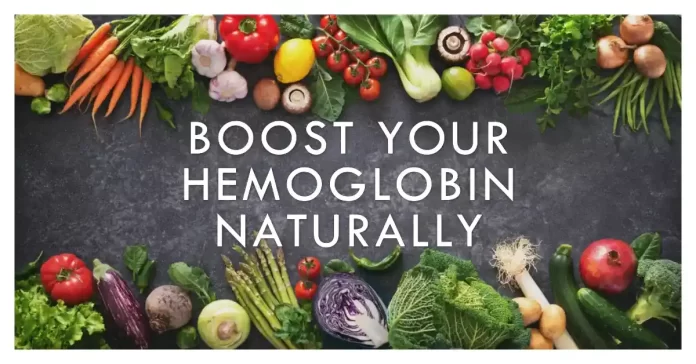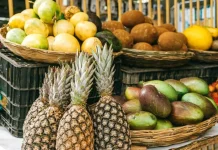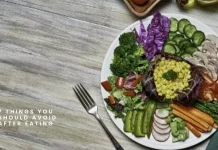Promoting optimal health and vitality requires boosting hemoglobin levels naturally. Hemoglobin is responsible for transporting oxygen throughout the body and plays a vital role, and insufficient levels can result in fatigue and various health concerns. This article delves into beneficial strategies, dietary recommendations, lifestyle adjustments, and potential supplements to enhance natural hemoglobin production in the blood.
Here Are 9 Tips To Boost Your Hemoglobin Naturally
Consume Iron-Rich Foods
Incorporate iron-rich foods in your diet to support hemoglobin production. Opt for sources like lean meats, poultry, fish, leafy green vegetables, legumes, and fortified cereals. These foods provide the necessary iron for red blood cell formation.Pair Iron with Vitamin C
Enhance iron absorption by consuming vitamin C-rich foods alongside iron-rich meals. Incorporate citrus fruits, strawberries, bell peppers, tomatoes, and broccoli into your diet to boost hemoglobin levels. Vitamin C plays a crucial role in converting dietary iron into a more readily absorbed form by the body.Opt for Foods High in Folic Acid
Folic acid is essential for the production of healthy red blood cells. Enrich your meals with leafy green vegetables (spinach, kale), legumes, citrus fruits, avocados, and fortified grains. These nutrient-rich options can contribute to increasing your hemoglobin levels naturally. These provide ample folic acid to support hemoglobin synthesis.Consume Vitamin B12-Rich Foods
Red blood cell formation relies on the crucial role of vitamin B12. Include sources like eggs, dairy products, lean meats, fish, and fortified plant-based alternatives. These foods provide the necessary vitamin B12 to support hemoglobin production.Incorporate Copper-Rich Foods
Copper is necessary for the synthesis of hemoglobin. Incorporate nuts, seeds, legumes, whole grains, dark chocolate, and organic meats into your diet. These dietary choices can effectively contribute to boosting hemoglobin levels naturally. These foods are rich in copper and can support healthy hemoglobin levels.Include Foods with High Vitamin A Content
Vitamin A is crucial for maintaining healthy blood cells, including red blood cells. Add carrots, sweet potatoes, spinach, bell peppers, and fish to your meals. These nutritious choices can help increase hemoglobin levels naturally and support overall health. These foods provide vitamin A, supporting optimal hemoglobin production.Increase Intake of Vitamin E
Vitamin E helps protect red blood cells from damage. Include nuts, seeds, spinach, broccoli, and avocados in every diet. These nutrient-rich foods can effectively boost hemoglobin levels naturally and promote overall health. These foods are rich in vitamin E and can support overall blood health.Consume Foods High in Riboflavin
Riboflavin (vitamin B2) is essential for red blood cell production. Include dairy products, lean meats, whole grains, leafy green vegetables, and mushrooms in every diet. These foods provide riboflavin to support hemoglobin synthesis.Stay Hydrated
Maintaining optimal blood volume and circulation is achieved by drinking 7-8 glasses of water a day. Proper hydration ensures the efficient transport of oxygen throughout the body by red blood cells. Therefore, it is crucial to prioritize sufficient water intake for overall well-being. Make it a goal to drink eight glasses of water per day.
Final Words
These natural approaches can enhance your overall well-being and improve your body’s capacity to carry oxygen by increasing hemoglobin levels naturally and effectively. Before making any significant changes to your diet or lifestyle, it is essential to consult with a healthcare professional. You can elevate your hemoglobin levels and enjoy the benefits of increased energy and vitality with dedication and consistency.
Frequently Ask Questions (FAQs)
What causes low hemoglobin levels?
Various factors can cause low hemoglobin levels, including iron deficiency, vitamin deficiencies (such as vitamin B12 and folate), chronic diseases, certain medications, and genetic conditions. Identifying and addressing the underlying cause is essential for increasing hemoglobin levels naturally.
Can diet alone increase hemoglobin levels?
Diet plays a significant role in supporting healthy hemoglobin levels. In rare cases, additional interventions may be necessary. It’s essential to identify the underlying cause of low hemoglobin and address it accordingly.
Which foods are rich in iron and can help increase hemoglobin?
Iron-rich foods that can help increase hemoglobin levels include lean meats, poultry, fish, leafy green vegetables (spinach, kale), legumes, fortified cereals, and dried fruits (such as raisins and apricots).
Are there any specific dietary restrictions for increasing hemoglobin?
Following a well-balanced diet rich in iron, vitamins, and minerals to support normal hemoglobin levels. However, certain individuals with specific health conditions may require individualized dietary modifications. Seek personalized advice from a healthcare professional or registered dietitian to receive tailored guidance and recommendations based on your needs and health goals.
How long does it take to see an improvement in hemoglobin levels with dietary changes?
The time it takes to observe an improvement in hemoglobin levels can vary depending on individual factors. Factors such as overall health, adherence to dietary and lifestyle changes, and the underlying cause of low hemoglobin can influence the rate of improvement. It’s essential to be consistent with dietary modifications and follow up with healthcare professionals for monitoring and guidance.










